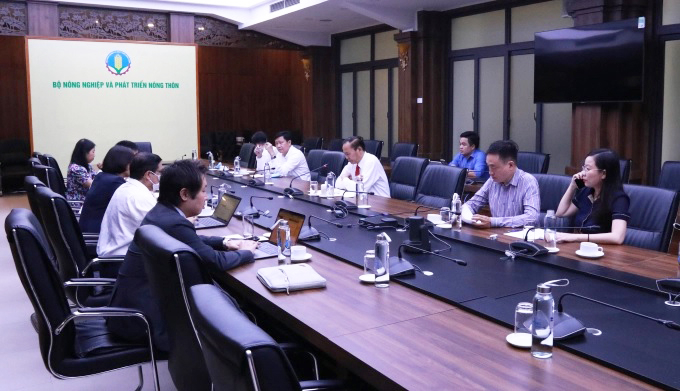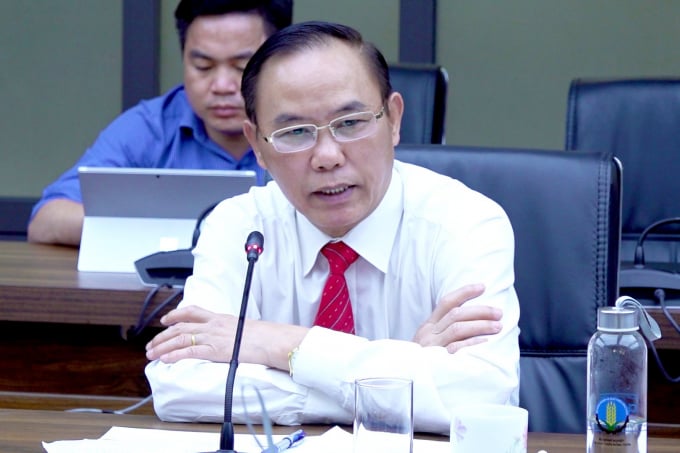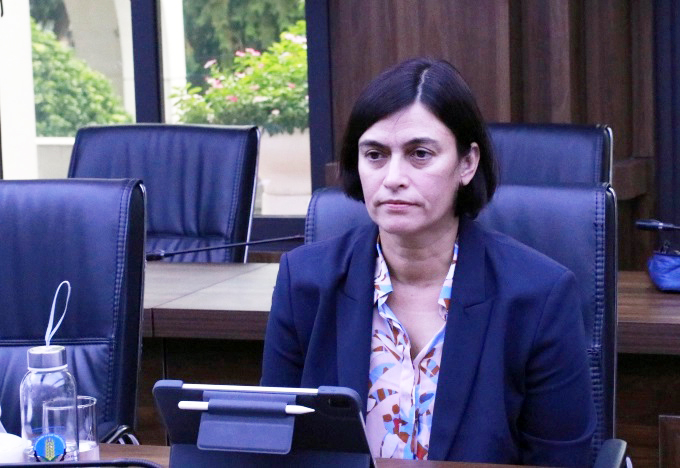June 1, 2025 | 11:43 GMT +7
June 1, 2025 | 11:43 GMT +7
Hotline: 0913.378.918
June 1, 2025 | 11:43 GMT +7
Hotline: 0913.378.918

Deputy Minister Phung Duc Tien had a conversation with the World Bank delegation on June 6 at the Ministry of Agriculture and Rural Development (MARD). Photo: Hoang Giang.
On June 6, Deputy Minister of Agriculture and Rural Development Phung Duc Tien had a meeting with Ms. Mona Sur, Director of the Environment, Natural Resources and Blue Economy Practice in the East Asia and Pacific region, World Bank (WB) to discuss more about the Sustainable Fisheries Development Project (SFDP) having loans from the World Bank.
This is the project with the fastest progress among the projects under the Ministry of Agriculture and Rural Development. However, there are still many limitations in meeting the time requirements. The Ministry of Agriculture and Rural Development has made great efforts in the preparation of related documents and achieved certain results, but there are still many shortcomings in the process of implementing the project.
The project management board said that Deputy Minister Phung Duc Tien had recently worked with the Minister of Planning and Investment (MPI) and the Ministry of Finance (MOF). The project management board had also received comments from the Ministry of Finance to adjust a number of investment items and objectives. A proposal document had been made to submit to the Minister of Finance.
“Through the seminar with the Department of Investment Supervision & Appraisal (MPI), we realized that there are a number of emerging issues that require assistance from the World Bank to be able to work smoothly with the Ministry of Planning and Investment, " said Mr. Le Van Hien, Director of the Project Management Board.

In order to speed up the project, Deputy Minister Phung Duc Tien suggested the project management board soon come to an agreement with the World Bank to draw out a clear and definitive project timeline. Photo: Hoang Giang.
Ms. Mona Sur and the WB delegation have been closely monitoring the project preparation process and have found that there are many delays due to various reasons, causing concern of both parties. "One of our biggest challenges is that it has been more than four years in preparation of this project, and we don’t seem to have a definite timeline as to when we will get to the stage of having the SFDP approved."
According to Ms. Mona Sur, the process of completing, approving and allocating budgets for proposals and studies on feasibility as well as social and environmental needs to be completed as soon as to be able to implement the project.
Regarding the financial source for the Sustainable Fisheries Development project, Ms. Mona Sur said that the Ministry of Finance has disqualified some investment items in 'non-infrastructure' equipment using this loan. “From the bank’s perspective, these investments on the technology and equipment, such as monitoring control and surveillance, are very important investments in the project. Those will need to remain and be covered by counterpart funds because we will not be able to only support the infrastructure.”

“We see this is a very important project for Vietnam. This project offers an opportunity to modernize and introduce new technologies in the fishery sector, so the World Bank is very committed to continue to finance the project.” - Ms. Mona Sur. Photo: Hoang Giang.
As shared by Mr. Le Van Hien, following Directive 18 of the Prime Minister on the management of ODA and concessional capital, the equipment will not use non-refundable aid, but instead use state budget capital for investment to ensure consistency with the project design.
Regarding this issue, Mr. Nguyen Do Anh Tuan, Director of the Department of International Cooperation (MARD), shared some information at the meeting: The MARD has recently coordinated with the MPI to send a letter of introduction for the Sustainable Fisheries Development Project to the Green Climate Fund (GCF) to receive a non-refundable aid, which is exclusively entrusted to the World Bank's Cooling Facility Fund. He asked the World Bank side to notify and update the progress when working with GCF.
He emphasized a fact that so far Vietnam has interacted with GCF and has two projects with a scale of 30-50 million dollars per project with Asian Development Bank (ADB) and United Nations Development Programme (UNDP). Many organizations have made efforts to encourage GCF mobilize non-refundable aid and low-interest loans for Vietnam. GCF has shown a lot of support for Vietnam in issues concerning environment and global climate change.
Deputy Minister Phung Duc Tien made a number of conclusions with the aim of speeding up the project progress. Firstly, the Project Management Board needs to come to an agreement with the World Bank to draw a clear and definitive timeline. Secondly, it is required to send an official dispatch to provinces and quickly convene a direct meeting in order to clearly identify the difficulties and problems. Thirdly, relevent parties in the project should put more effort in promoting the signing of approval from the Ministry of Finance and the Government.
Especially on the issue of preferential loans, Deputy Minister Phung Duc Tien suggested the World Bank side actively work with the Ministry of Finance and the Ministry of Planning and Investment in the matter of ensuring a reasonable loan fee and having non-refundable aid items in the capital structure.
Translated by Samuel Pham

(VAN) Several scientists and farmers are experimenting with soil treatment in some key durian-growing regions such as Cai Lay (Tien Giang), Dak Song, Gia Nghia, and Dak R’lap (Dak Nong).
/2025/05/25/4127-3-073637_820.jpg)
(VAN) Thanks to the promotion from an FAO-implemented project, vegetable production in greenhouses in Moc Chau has seen strong development, from 1.5 hectares in 2021 to nearly 50 hectares in 2024.

(VAN) FAO has recently supported USD 140,000 to implement the project 'Risk mitigation human-animal interface risks through disease control initiatives in pig farming.'

(VAN) The People's Committee of Tra Vinh province has approved an adjustment to the investment policy for the Green Hydrogen Plant project, increasing its area to approximately 52.76 hectares.
![Reducing emissions from rice fields: [2] Farmers’ commitment to the soil](https://t.ex-cdn.com/nongnghiepmoitruong.vn/608w/files/news/2025/05/05/dsc08881jpg-nongnghiep-140632.jpg)
(VAN) Clean rice cultivation model in Thuong Tan commune, Bac Tan Uyen district, is assisting local residents in achieving sustainable agriculture by substantially reducing costs, increasing productivity, and protecting the environment.

(VAN) At the conference to disseminate Resolution No. 68, AgriS introduced its digital agricultural ecosystem and reaffirmed its commitment to accompanying the Government in promoting private sector development and sustainable agriculture.

(VAN) 'Blue Ocean - Blue Foods' initiative is designed to restore marine ecosystems and establish sustainable livelihoods for local communities by cultivating a minimum of 1,000 hectares of cottonii seaweed in the first three years.